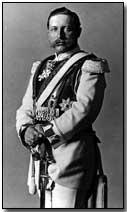Who's Who - Kaiser Wilhelm II
 Kaiser Wilhelm II (1859-1941),
Germany's last Kaiser, was born in Potsdam in 1859, the son of Frederick III
and Victoria, daughter of Queen Victoria.
Kaiser Wilhelm II (1859-1941),
Germany's last Kaiser, was born in Potsdam in 1859, the son of Frederick III
and Victoria, daughter of Queen Victoria.
Wilhelm's upbringing was strict and authoritarian. He was educated first at the Kassel Gymnasium and then at the University of Bonn.
Wilhelm became emperor of Germany in 1888 following the death of Frederick II. At the time of his accession Otto von Bismarck was still German Chancellor; however he was effectively dismissed from office by Wilhelm II two years later. The elderly Bismarck proved unable - or unwilling - to manipulate the new Kaiser as he had his predecessor.
Wilhelm was an overtly militaristic man, and believed fervently in increasing the strength of Germany's armed forces. In particular he was keen to develop a German navy the equal of Britain's Royal Navy, encouraged by Admiral Alfred von Tirpitz; the latter desire prompted the Liberal administration of the 1900's to finance rearmament of the Royal Navy.
Wilhelm's policy towards Britain was by turns contradictory. Whilst supporting South Africa during the Second Boer War of 1899-1902, he attempted a reconciliation shortly afterwards. He held a senior position within the British armed forces; and he confessed that he could not envisage a war with Britain. Yet he publicly criticised King Edward VII, whom he described as Satan. Even after war was declared in August 1914 he wrote that war would never have occurred had Queen Victoria, who died in 1901, still held the British throne.
Wilhelm suffered a nervous breakdown in 1908, consequently playing a lesser role in the government of Germany for the following few years. Wilhelm was, however, no friend of democracy.
Following the assassination of Archduke Franz Ferdinand of Austria-Hungary on 28 June 1914, Wilhelm and his Chancellor, Theobald von Bethmann-Hollweg, incited Austria-Hungary to exact revenge against Serbia. Events spiralled throughout July resulting in the First World War (click here to read Wilhelm's views of the Austro-Hungarian ultimatum).
Wilhelm appeared not to foresee the consequences of an Austro-Hungarian attack on Serbia, pulling France, Russia and Britain into the war. Too late he attempted to scale back German involvement: he was firmly dissuaded by the German military. (Click here to read Wilhelm's account of the events of July 1914.)
Wilhelm operated as Commander in Chief of the German armed forces throughout the war. Notwithstanding this, the German military operated under its own effective control: Wilhelm was essentially a figurehead. Wilhelm opposed the replacement of Erich Falkenhayn with Paul von Hindenburg in August 1916, but the dismissal of Falkenhayn took place nonetheless.
Despite the great push of Spring 1918, which nearly won the war for Germany, Germany's ability to win the war in 1918 collapsed, as U.S. involvement took on real form, and shortages at home in Germany spun out of control. It became clear that Germany was set to lose the war.
With revolution spreading to Berlin, Wilhelm was forced to abdicate on 9 November 1918. Chancellor Max von Baden pre-empted Wilhelm's decision by announcing his abdication to the public. Wilhelm sought exile in Holland, where he lived for the rest of his life. Holland refused to extradite Wilhelm as a war criminal to the Allies following the Armistice.
The text of Kaiser Wilhelm II's abdication proclamation:
I herewith renounce for all time claims to the throne of Prussia and to the German Imperial throne connected therewith. At the same time I release all officials of the German Empire and of Prussia, as well as all officers, non-commissioned officers and men of the navy and of the Prussian army, as well as the troops of the federated states of Germany, from the oath of fidelity which they tendered to me as their Emperor, King and Commander-in-Chief. I expect of them that until the re-establishment of order in the German Empire they shall render assistance to those in actual power in Germany, in protecting the German people from the threatening dangers of anarchy, famine, and foreign rule.
Proclaimed under our own hand and with the imperial seal attached.
Amerongen, 28 November, 1918
Signed WILLIAM
With Hitler's rise to power in 1933, Wilhelm harboured hopes of restoration of his throne, and made tentative representations to that effect; they came to naught. Even so, Wilhelm supported German nationalism as personified by Hitler.
Wilhelm wrote two volumes of memoirs during the 1920's. Memoirs 1878-1918 was published in 1922, and My Early Life followed in 1926.
Kaiser Wilhelm II died in 1941.
Click here to view film footage of the Kaiser in 1913 at a military gathering; click here to view footage of him meeting with his Generals the same year; click here to view footage of the Kaiser with his generals after war had been declared in August 1914.
Click here to read the Kaiser's views on the use of force in northern France. Click here to read Wilhelm's letter to U.S. President Woodrow Wilson on the use of 'Dum Dum' bullets in Belgium in 1914. Click here to read his telegram of congratulation to Crown Prince Wilhelm following the French failure at the Aisne and Champagne in April 1917. Click here and here to read Wilhelm's appeals to the German Army as defeat approached in October 1918. Click here to read Wilhelm's proclamation announcing a representative form of government in late October 1918. Click here to read the Kaiser's views on seeking exile in Holland.
A "listening post" was an advanced post, usually in no-man's land, where soldiers tried to find out information about the enemy.
- Did you know?
